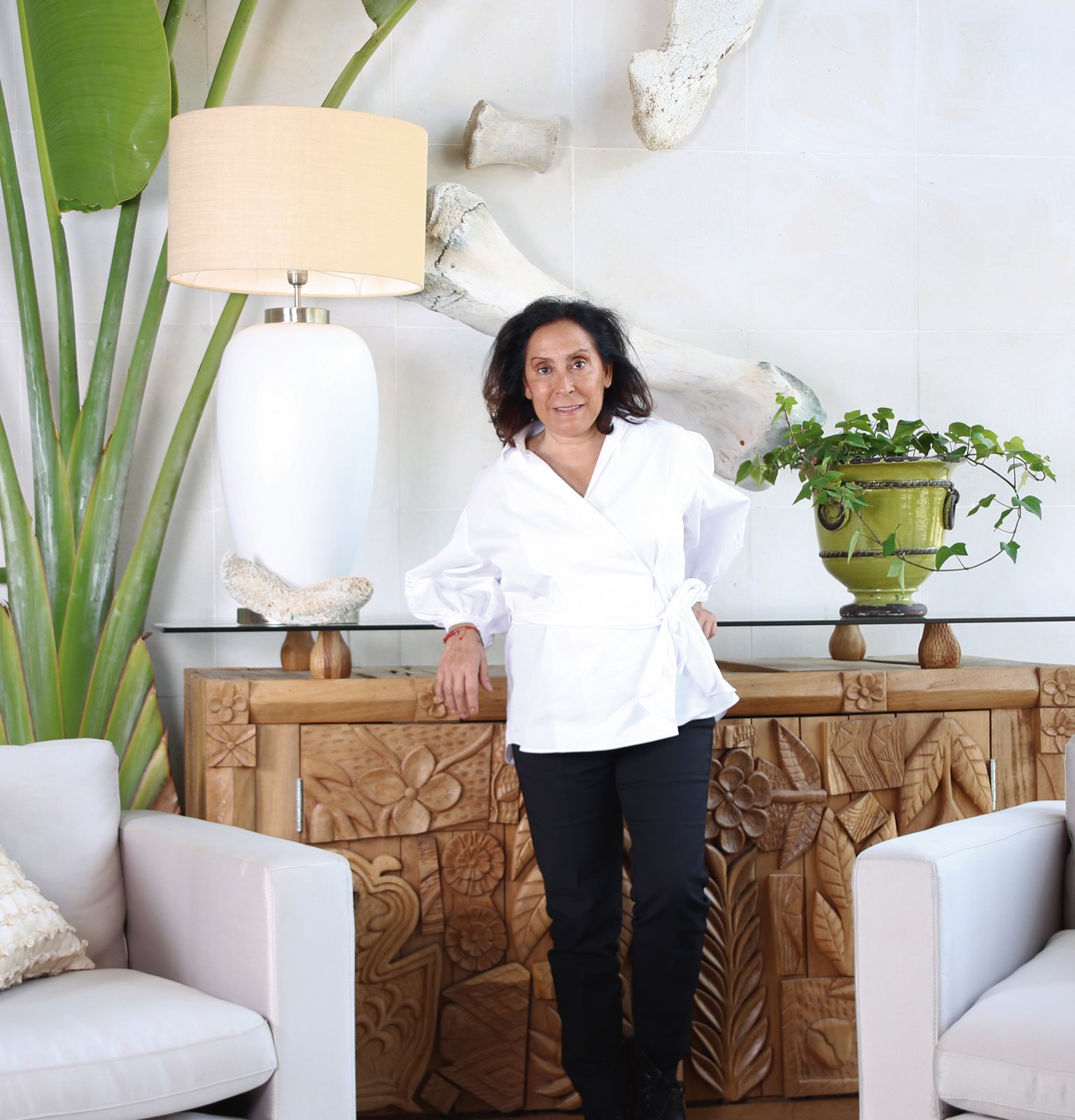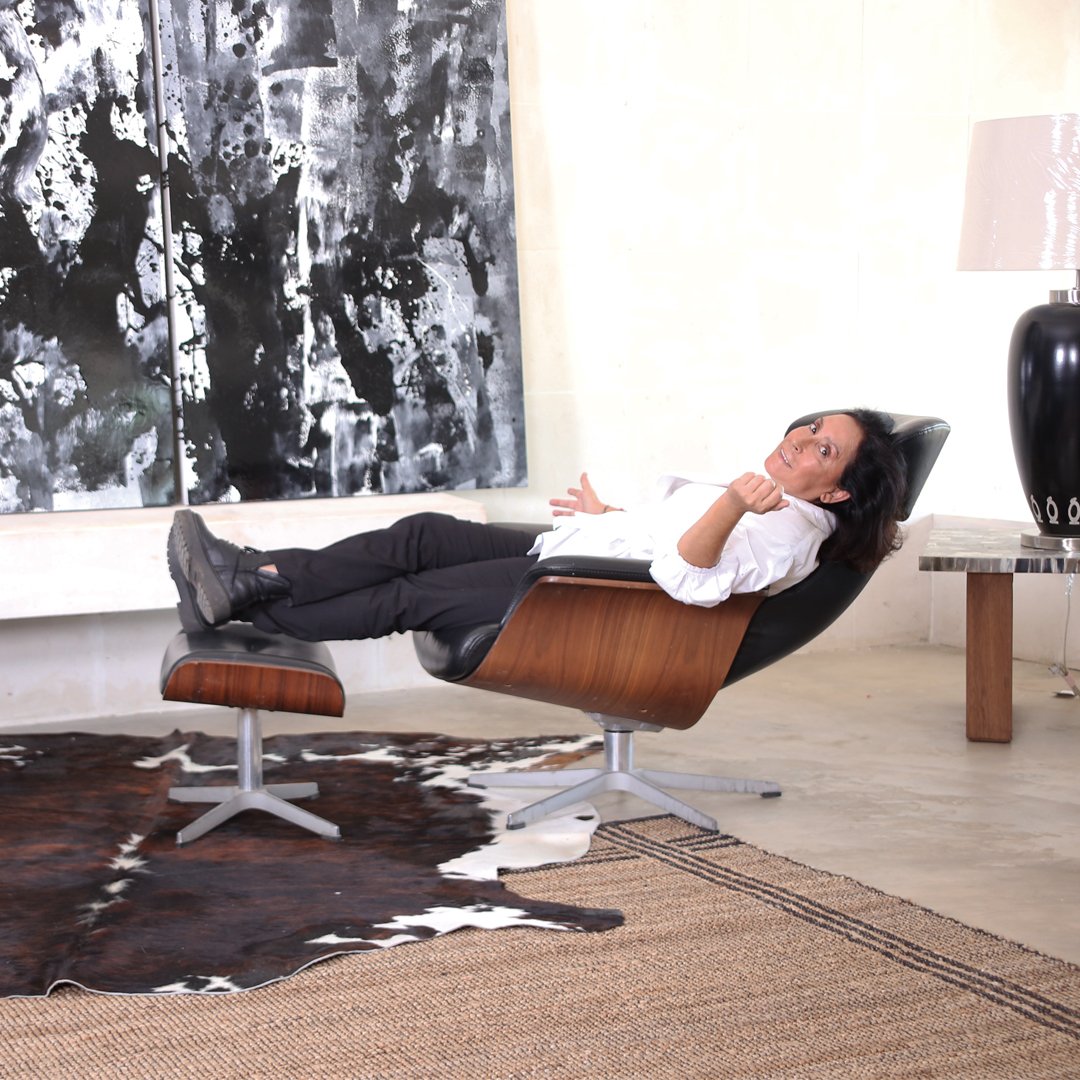
She goes by the name Raízes Cruzadas in the world of interior design. Paula Tavares is a woman of Portuguese roots with an Angolan heart. She has an inspiring story when we look at her 30-year journey in Angola. As she would put it, it wasn’t enough to dream or create, but Angola has brought her success. She sees herself as a full-time «consensus person» and finds an escape from her everyday life in painting. Now it’s Paula’s turn, the entrepreneur who creates projects with roots that connect around the world.
What made you leave Portugal and set off for Angola?
I’ve always had an intense fascination with Africa, even without having been there. At first, I was drawn to the intense colours of the landscapes and the sunsets, which I had never seen in the northern hemisphere. Then there were the sounds of the music, the rhythm that lifts you out of your seat. I had read about different Angolas, but all of them pulsating and full of magic. That was until the day I received an invitation to take on a project involving my greatest passion, at which point I decided to realise what Fernando Pessoa wrote: «Put all of what you are / Into the smallest thing you do». With my suitcases packed, I set off in search of a new direction, with my soul wide open to discover a new country: Angola.
In Angola, you founded Raízes Cruzadas, a brand working in interior decoration...
Raízes Cruzadas is the result of more than 30 years in Angola. I’ve had magnificent experiences, such as working with materials as premium as Angolan wood, through which I’ve been able to immerse myself in all the new dimensions and even grow within them. Raízes Cruzadas is another way of looking at Angola and its potential and, in fact, the country has good craftsmen; proof of this is the work that I produce using Angolan labour. All the items I produce have a soul and tell stories, not to mention that they reflect the good things about this country.
You create a very distinctive design with your projects. If you could define it, what would you say?
Design is born from observation, challenge and the courage to experiment with unthinkable materials, deconstructing the obvious and questioning whether (or not) we would put that piece in our home. It’s not enough to just create. In this respect, I like to define my pieces as poetry that adds comfort, that makes it possible to have new visual and aesthetic experiences, that welcomes with affection, enabling inner harmony to be built. Creation needs to flow within us and from us to others, just like poetry.
Do you see talent in the Angolan people? If so, how do you contribute to stimulating it?
Yes. They are a people who suffer and don’t have access to abundance, but who reinvent themselves and make the best of what they have. A people that does not give up on its traditions and which has an immense love for the land they were born in. Nowhere else in the world would I have received what I have received here, which is why I have stayed here, receiving this nationality with such great pride. The way I can give back all the love, solidarity, fraternity and protection I’ve been given is by taking care of my co-workers, seeing them as family. I realise how lucky I am to work in a reality so rich in ancestral experiences, in a culture where voices sing with the hands that produce.
«The country has good craftsmen»
What made you leave Portugal and set off for Angola?
I’ve always had an intense fascination with Africa, even without having been there. At first, I was drawn to the intense colours of the landscapes and the sunsets, which I had never seen in the northern hemisphere. Then there were the sounds of the music, the rhythm that lifts you out of your seat. I had read about different Angolas, but all of them pulsating and full of magic. That was until the day I received an invitation to take on a project involving my greatest passion, at which point I decided to realise what Fernando Pessoa wrote: «Put all of what you are / Into the smallest thing you do». With my suitcases packed, I set off in search of a new direction, with my soul wide open to discover a new country: Angola.
In Angola, you founded Raízes Cruzadas, a brand working in interior decoration...
Raízes Cruzadas is the result of more than 30 years in Angola. I’ve had magnificent experiences, such as working with materials as premium as Angolan wood, through which I’ve been able to immerse myself in all the new dimensions and even grow within them. Raízes Cruzadas is another way of looking at Angola and its potential and, in fact, the country has good craftsmen; proof of this is the work that I produce using Angolan labour. All the items I produce have a soul and tell stories, not to mention that they reflect the good things about this country.
You create a very distinctive design with your projects. If you could define it, what would you say?
Design is born from observation, challenge and the courage to experiment with unthinkable materials, deconstructing the obvious and questioning whether (or not) we would put that piece in our home. It’s not enough to just create. In this respect, I like to define my pieces as poetry that adds comfort, that makes it possible to have new visual and aesthetic experiences, that welcomes with affection, enabling inner harmony to be built. Creation needs to flow within us and from us to others, just like poetry.
Do you see talent in the Angolan people? If so, how do you contribute to stimulating it?
Yes. They are a people who suffer and don’t have access to abundance, but who reinvent themselves and make the best of what they have. A people that does not give up on its traditions and which has an immense love for the land they were born in. Nowhere else in the world would I have received what I have received here, which is why I have stayed here, receiving this nationality with such great pride. The way I can give back all the love, solidarity, fraternity and protection I’ve been given is by taking care of my co-workers, seeing them as family. I realise how lucky I am to work in a reality so rich in ancestral experiences, in a culture where voices sing with the hands that produce.
«The country has good craftsmen»





